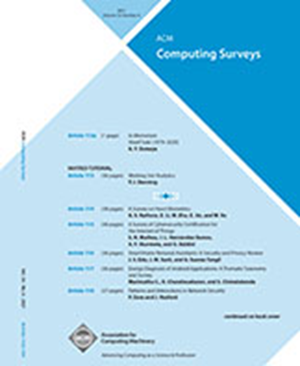Modality deep-learning frameworks for fake news detection on social networks: a systematic literature review
IF 23.8
1区 计算机科学
Q1 COMPUTER SCIENCE, THEORY & METHODS
引用次数: 0
Abstract
Fake news on social networks is a challenging problem due to the rapid dissemination and volume of information, as well as the ease of creating and sharing content anonymously. Fake news stories are problematic not only for the credibility of online journalism, but also due to their detrimental real-world consequences. The primary research objective of this study is: What are the recent state-of-the-art modalities based on deep learning to detect fake news in social networks. This paper presents a systematic literature review of deep learning-based fake news detection models in social networks. The methodology followed a rigorous approach, including predefined criteria for study selection of deep learning modalities. This study focuses on the types of deep learning modalities; unimodal (refers to the use of a single model for analysis or modeling purposes) and multimodal models (refers to the integration of multiple models). The results of this review reveal the strengths and weaknesses of modalities approaches, as well as the limitations of low-resource languages datasets. Furthermore, it provides insights into future directions for deep learning models and different fact checking techniques. At the end of this study, we discuss the problem of fake news detection in the era of large language models in terms of advantages, drawbacks, and challenges.用于社交网络假新闻检测的模态深度学习框架:系统性文献综述
社交网络上的假新闻是一个具有挑战性的问题,这是因为信息传播速度快、数量大,而且匿名创建和分享内容非常容易。假新闻不仅会影响网络新闻的可信度,还会对现实世界造成有害影响。本研究的主要研究目标是最近有哪些基于深度学习的先进模式来检测社交网络中的假新闻。本文对基于深度学习的社交网络假新闻检测模型进行了系统的文献综述。研究方法遵循严格的方法,包括预定义的深度学习模式研究选择标准。本研究侧重于深度学习模式的类型;单模态(指使用单一模型进行分析或建模)和多模态模型(指整合多个模型)。综述结果揭示了模式方法的优缺点,以及低资源语言数据集的局限性。此外,它还为深度学习模型和不同事实检查技术的未来发展方向提供了见解。在本研究的最后,我们从优势、缺点和挑战三个方面讨论了大型语言模型时代的假新闻检测问题。
本文章由计算机程序翻译,如有差异,请以英文原文为准。
求助全文
约1分钟内获得全文
求助全文
来源期刊

ACM Computing Surveys
工程技术-计算机:理论方法
CiteScore
33.20
自引率
0.60%
发文量
372
审稿时长
12 months
期刊介绍:
ACM Computing Surveys is an academic journal that focuses on publishing surveys and tutorials on various areas of computing research and practice. The journal aims to provide comprehensive and easily understandable articles that guide readers through the literature and help them understand topics outside their specialties. In terms of impact, CSUR has a high reputation with a 2022 Impact Factor of 16.6. It is ranked 3rd out of 111 journals in the field of Computer Science Theory & Methods.
ACM Computing Surveys is indexed and abstracted in various services, including AI2 Semantic Scholar, Baidu, Clarivate/ISI: JCR, CNKI, DeepDyve, DTU, EBSCO: EDS/HOST, and IET Inspec, among others.
 求助内容:
求助内容: 应助结果提醒方式:
应助结果提醒方式:


